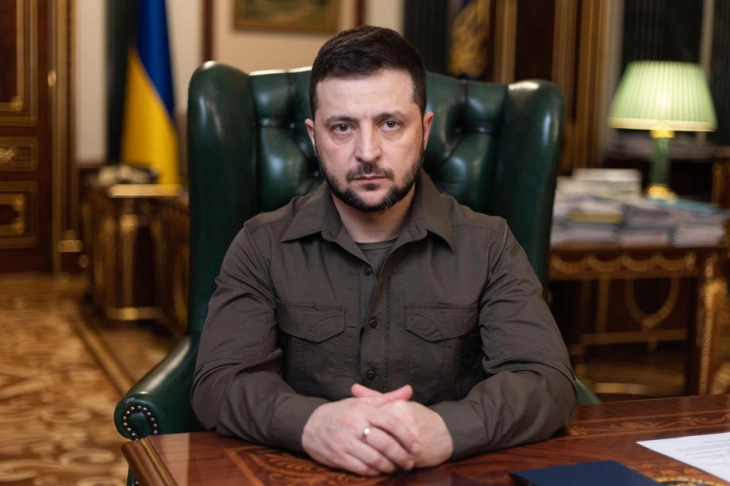Xi and Zelensky speak in first call since Russia's war on Ukraine
- Chinese state leader Xi Jinping and Ukrainian President Volodymyr Zelensky have held a telephone conversation for the first time since the beginning of the Russian invasion of Ukraine last year, Zelensky and Chinese state media said on Wednesday.
- Post By Ivan Kolekevski
- 18:08, 26 April, 2023

Beijing, 26 April 2023 (dpa/MIA) - Chinese state leader Xi Jinping and Ukrainian President Volodymyr Zelensky have held a telephone conversation for the first time since the beginning of the Russian invasion of Ukraine last year, Zelensky and Chinese state media said on Wednesday.
Zelensky spoke of a "long and meaningful call." The president said he believed the conversation would give a "powerful impetus" to the countries' bilateral relations, in a post on Twitter.
Xi announced his intention to send a special envoy to Kiev and other countries to exchange views with all parties on a political solution to the conflict.
Chinese state media reported that the president also issued a strong warning against a nuclear escalation of the Ukraine war and urged all parties involved to remain calm.
"There are no winners in a nuclear war," Xi said.
Xi also reiterated that respect for sovereignty and territorial integrity was the political foundation for China-Ukraine relations, according to state television. The "complicated development of the Ukraine crisis" has a strong influence on the international situation, he said.
It is the first one-to-one conversation Xi and Zelensky have had since Russia's full-scale invasion of Ukraine more than a year ago.
China is backing Russian President Vladimir Putin in the conflict, a stance that has earned Beijing much international criticism.
Meanwhile, Ukrainian Foreign Minister Dmytro Kuleba has accused NATO of lacking the "political will" to allow his country to join the defence alliance quickly.
"Everything is possible when there is political will," the 42-year-old said in an interview with US broadcaster CNN on Tuesday evening. The diplomat referred to the recent accession of Finland, which he said was unimaginable not long ago.
"As long as Ukraine remains outside NATO, there will be a risk of repeated Russian aggression against Ukraine," Kuleba underlined.
He recalled the 2008 NATO summit in Bucharest, at which Ukraine had already been granted the prospect of membership. At the upcoming NATO summit in Lithuania's capital Vilnius in July, Kiev expects concrete membership commitments from the military alliance.
On the ground in Ukraine, Kiev's forces defending the city of Bakhmut in eastern Ukraine are fiercely trying to maintain control of the supply line for troops resisting Russian encirclement, the British Ministry of Defence (MoD) in London said on Wednesday, citing intelligence.
Fighting mainly concentrated on an area near the village of Khromove west of Bakhmut, it said.
"Ukraine's other supply options into Bakhmut are likely complicated by muddy conditions on unsurfaced tracks," the MoD said.
Also on Wednesday, the Russian armed forces said they have trained soldiers from Moscow's ally Belarus on tactical nuclear missiles before the planned deployment of them in the neighbouring country.
The Defence Ministry in Moscow also published a video purporting to show the training on a Russian military training ground in the south of Belarus. A missile complex of the type Iskander-M could be seen in the video. The missiles can be equipped with conventional, but also with nuclear warheads.
Russian President Putin defended its stationing of nuclear missiles in Belarus as a response to the expansion of NATO, which recently accepted Finland as the 31st member of the military alliance.
Meanwhile, Ukraine and Russia have once again exchanged prisoners of war.
"We managed to bring 44 of our people home," the head of the presidential office in Kiev, Andriy Yermak, wrote on Telegram on Wednesday. He said the group included 36 soldiers and six officers who had been defending the south-eastern Ukrainian port city of Mariupol, among other places. In addition, two civilians were released.
The Russian Defence Ministry said as part of the swap, 40 of its own soldiers had been taken by plane to Moscow for the necessary treatment and rehabilitation.
During a conference on the reconstruction of Ukraine in Rome, Italian Prime Minister Giorgia Meloni said she expects Ukraine to be closer to Europe in the future.
"Talking about the reconstruction of Ukraine means betting on victory and the end of the conflict," she said on Wednesday during the meeting also attended by Ukraine's head of government Denys Shmyhal and Foreign Minister Dmytro Kuleba, among others.
Meloni expressed certainty that Ukraine's future would be in peace, prosperity and ever closer to Europe.
Photo: EPA







